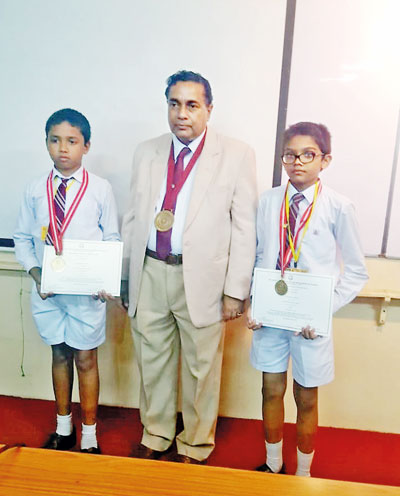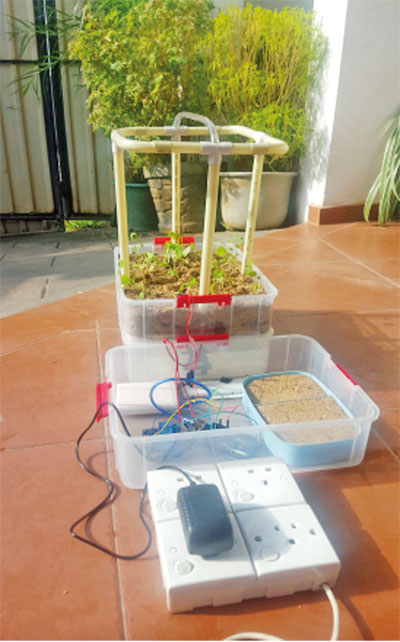To save mother’s dying plants, two Nalandians invent gold-medal-winning automatic watering system
View(s): Nalanda College science students won the gold medal for their outstanding invention at the All Island School Inventors’ Competition cum Exhibition, a platform for Sri Lanka’s brightest young minds to showcase their talents in science. The Science & Technology 70 exhibition was held from December 5 to 8 at the Colombo University’s Science Faculty premises. It was organised by the Sri Lanka Association for the Advancement of Science (SLAAS) with the aim of providing a platform for innovations and inventions conceptualised by schoolchildren and inculcating in them a creative culture and research mindedness.
Nalanda College science students won the gold medal for their outstanding invention at the All Island School Inventors’ Competition cum Exhibition, a platform for Sri Lanka’s brightest young minds to showcase their talents in science. The Science & Technology 70 exhibition was held from December 5 to 8 at the Colombo University’s Science Faculty premises. It was organised by the Sri Lanka Association for the Advancement of Science (SLAAS) with the aim of providing a platform for innovations and inventions conceptualised by schoolchildren and inculcating in them a creative culture and research mindedness.
Many schools across the country gathered under one roof to display their students’ talent. Two Nalandians — Grade six student Ositha Wijayarathna and Grade 10 student Minul Pelandagama studying — clinched the gold medal for their outstanding conception, an ‘automatic watering system for indoor and outdoor gardening.’
After winning the gold medal, Minul said, “My mother loves gardening and planting. But being a working mum, she always got home late and had no time to water the plants. Thus they all ended up dying. She tried out several options, but failed. This made me and my friend come up with the concept of an automatic watering system.”
Explaining the mechanisms of the device, he said the system uses a sensor to monitor the moisture level of the soil. When the soil becomes dry, the sensor detects the low moisture level and automatically switches on the water pump. Once the soil is adequately watered, the sensor detects the elevated moisture level, causing the water pump to stop automatically. The water pump is operated through a relay switch.
The two students said the two higher and lower threshold moisture values have been set by them. They said the process was based on an Arduino system. These values can be adjusted based on the type of plant being grown. Arduino is one of the most user-friendly open source software. Its specialty is that it is simple, clear and inexpensive and can be run on Mac and Windows as well as on Linux. Thus, it has enabled many striking inventions of the present era.
The system is made in such a way that if there’s excess water in the soil, it can be drained through a filtering system and sent to a storage tank built below. This water can be re-used for various purposes.
Since water is a scarce resource today, the system is made to achieve high efficiency in terms of water conservation, with reduced runoff and less evaporation.
The students said the system could be adopted by busy farmers and crop cultivators. No surface shaping is required for this system. It can be easily adjusted to suit the available space and thus this concept can be used in vertical farming and in-door gardening in offices and apartments.
Although mains electricity was used in this system to power up the arduino system, in commercial usage solar power can be used. Starting a project is not as easy as it seems to be. It needs dedication, commitment and passion along with knowledge. It had taken nearly three weeks for them to complete this system. Speaking about challenges, Ositha said that designing the water distributing frame and coding the arduino programme had been difficult. “We want to further develop this system to introduce it to the agriculture sector and indoor gardening and we are currently working on it.” Minul enthusiastically added.
This is not the only project the two students have put forward. They have invented an obstacle avoidance robot and a soil moisture sensor. These have also been recognised as outstanding and placed second from their grade in one of the invention exhibitions at Nalanda College, Colombo. “We are more interested in robotics engineering and our future ambition is to study further about those subjects to serve our country,” Ositha said.
The two students extended their heartfelt gratitude to their parents, teachers and their ‘mother’ Nalanda College for all the support and guidance given to them.
- Ramalka Kasige



